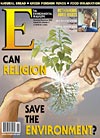
 |
|
Volume XIII, Number 6 CONVERSATIONS |
 |
|
Gorman was a speechwriter and press secretary for Senator Eugene McCarthy in the 1968 presidential campaign, and was a popular radio host on listener-supported WBAI in New York City for 28 years. He has taught at a variety of universities, and he served as vice president for programs at New York’s Episcopal Cathedral of St. John the Divine, where he began his work linking religious groups with environmental action. E Magazine: You said you see a universal awakening of religious life, not just another campaign. Could you explain? Paul Gorman: This is not just another issue, cause, campaign or movement. We are not the environmental movement at prayer. We are not recruiting shock troops for embattled greens. We are not trying to change a paragraph of legislation in Congress. We’re about principles, not particulars. And the goal here is primarily to be faithful to God, not to create just another social movement. This is a new awakening of religious life to its perennial teachings. What some describe as the environmental challenge is, for us, a challenge to our understanding of our faith, and the response of religious life to a crisis in God’s creation at the hands of God’s children. The narrower activist agenda that we sometimes bring to social issues can be too constrictive to understand the monumentality of what is beginning to happen. I think it is probably fair to say that this experience is an awakening that is happening to all of humankind. Why now? In the scriptural tradition, there is a teaching of “signs of the times,” which designates a moment in history when a generation is called to respond to God under very particular conditions. The relentless magnitude of environmental degradation is clearly the overarching social, political, economic and cultural challenge for our generation, linked with the ongoing struggle for social justice. Many of us feel this is who we have to be here and now, religiously. One might have the sense that many denominations, which previously have seen their mission as helping the world’s poor, have broadened that goal to include saving God’s creation. The challenge for us is comprehensiveness. We have to integrate the “environmental perspective” into all expressions of religious life, whether from the pulpit or in public policy. And the most fundamental integration needs to be between environmental sustainability and social justice. Getting that message across is obviously what you’re trying to do with the National Religious Partnership for the Environment, which is now 10 years old. What do you think has been accomplished so far? From one perspective, it’s enough of an accomplishment to say that many, many people are beginning to wake up, because religious life starts with wakefulness! Somebody may hear of an endangered species in their watershed, and all of a sudden make a connection with our covenant with God in Genesis to protect all creation. Somebody might realize that the pollution of poor neighborhoods has something to do with the journey of an oppressed people in the Sinai covenant. Somebody may realize that their moments of deepest awareness of God’s presence seem most frequently to happen when they are under the boughs of a willow tree, or scanning a starry sky. A second success is that this sort of awakening has found expression in traditional forms of religious teaching and celebration. A third point is that people are becoming active very diversely. For some that might mean local cleanups, and for others that might mean energy conservation or public policy advocacy. The question of dominion versus stewardship seems to cross over into many different faiths. Is that the central question? We now have the power to affect the entire planetary environment—so, dominion is a given. The question is what will be the character of our presence. Human beings didn’t need the teaching of dominion to ravage the Earth, and they’re not going to change their behavior simply by changing the word. The energy-efficiency group California Interfaith Power and Light provides a way of doing something concretely where people live, in their very own church buildings for example. Do you see that as a gathering force: acting locally, thinking globally? California Interfaith Power and Light is one example of how people are seeking ways to embody and express their convictions. It’s not easier for any of us to undertake more sustainable habits than people outside the religious community. We’re just as consumed by consumerism as everybody. That’s why I like that phrase, “What Would Jesus Drive?” The evangelical Christian community routinely asks, “What Would Jesus Do?” or “WWJD”; it’s in all kinds of study groups. People have bracelets. This is a serious form of reflection on behavior in that community. Are you optimistic or pessimistic? Somebody once asked me if I thought the glass was half empty or half full, and I answered: what glass? I meant that it’s very difficult to measure a process of awakening. I think the creation care perspective has become a dimension of religious life and imagination once and for all. I tried to get my thinking down to six or seven words, and came up with: “Care for creation brings life to faith.” By responding to a crisis in God’s creation, we’re coming closer to God’s law and God’s love. |